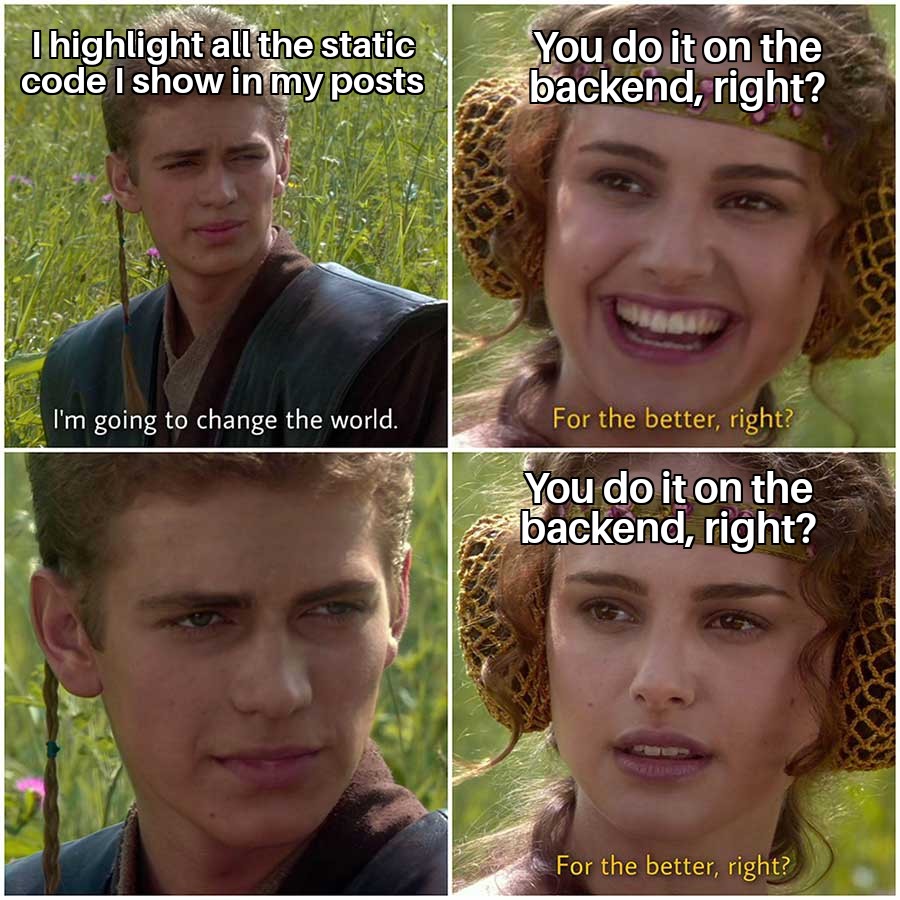Syntax highlighting on the backend
Let's say you want to put on your website, I don't know, the glorious Java anthem by NanowarOfSteel, HelloWorld.
So you open a pre tag, then a code tag, put everything inside, and this is what happens:
package it.nanowar.ofsteel.helloworld;
public class HelloWorldMainLauncherClass {
public HelloWorldMainLauncherClass( int foo ) {
super();
this.foo = foo;
}
// etc.
}What did you expect, magic? That the browser would color it for you automatically?
The harsh reality
We'll have to see what people do, right? Because this problem is so typical that it will be more than solved, in a simple and elegant way, right? RIGHT?

Well, the harsh reality is that, like almost everything in this life, the vast majority of people do it wrong.
Because yes, according to a study by the University of Yolo Valgo, more than 87% of websites that publish code do the coloring on the frontend with a javascript library.
I'm not going to discuss here why that's horrible, unless it's code that will change after you send it to the client. Read this gentleman, with whom I fully agree and who explains it much better than I do.
But hey, in our stack there will be a way to do it right, some good practices so as not to reinvent the wheel... this will be the most normal thing in the world, right?
If so, do you think this section would be called "the harsh reality"? Well, that's it.
I’ve been searching like crazy, and there’s nothing even halfway decent. I tried adapting a couple of libraries and tools, but I wasn’t happy with the results. They added complexity that wasn’t worth it, and I was going way off scope...
So in the end I ended up using an outdated port of highlight.js. Which has its limitations and since it's outdated, it does not look exactly the same as, for example, on StackOverflow. But here you have the result, colored from the backend:
package it.nanowar.ofsteel.helloworld;
public class HelloWorldMainLauncherClass {
public HelloWorldMainLauncherClass( int foo ) {
super();
this.foo = foo;
}
private Integer foo = 0;
public void songRefrain() {
for (int i = 0; i < foo; i++) {
System.out.println("Hello World!");
}
int pippo = 0;
while (pippo < foo) {
System.out.println("Hello World!");
pippo++;
}
}
public static void main (String [] args) {
System.out.println("Hello World Programmer Start");
HelloWorldMainLauncherClass tizio = new HelloWorldMainLauncherClass(2);
tizio.songRefrain();
System.out.println("Program Finished!");
tizio.falseMethod();
}
/*
* If I may introduce a bug, the JVM will manage it for me
* ensuring both security and portability
* Then I'll write my code once, and run it everywhere!
* With Static and Strong Typing, will let my programs be type safe!
*/
public void falseMethod() {
boolean metal=false;
if(metal==false) {
String joeyDeCaio = null;
joeyDeCaio.length();
}
}
}Want me to go into more detail about this trick? Then click this button like crazy: